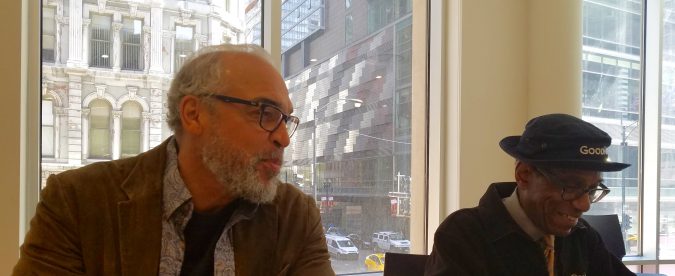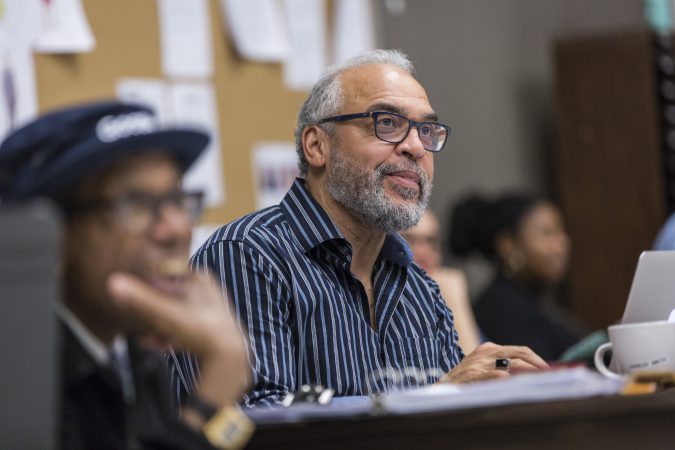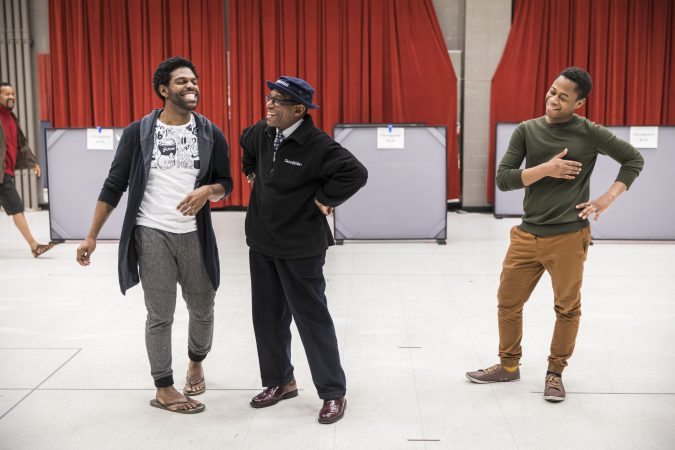In today’s culture of quickly and carelessly labeling others, the term “refuge” can easily be thrown out without consideration to the invisible scars that run deep for those who are truly displaced from their homeland.
But the critically acclaimed play “Objects in the Mirror” seeks to shed light on the emotions and plight of refuges. The play centers around the lives of a family of Liberian refugees who escape the violence of their country. First premiered on the Goodman Theatre stage in 2015 by playwright Charles Smith, the production features a 5-member cast, revealing the lifelong secret for one family member who tries to start a new life.
The play returns with a stellar ensemble and is directed by Chuck Smith, the Goodman Theatre’s Resident Director who also sits on the Goodman’s Board of Trustees.

Both Chuck Smith and Charles Smith have at times been confused as the same person—sharing the same name within mutual Chicago theater circles. Nearly 30 years ago, having directed several productions at the Victory Gardens Theatre, [Chuck] Smith was making a name for himself, carving out a role as a rising director on the Chicago theater scene.
He recalls his first encounter with Charles Smith. “Charles was there working in the office, he would always answer the phone, ‘Victory Gardens Theatre, Charles Smith speaking.’ Somebody would say, ‘I saw the show you did.’ He would correct them and tell them, that is Chuck Smith the director. I’m Charles Smith the writer. This went on for several months,” [Chuck] Smith said.
Until finally, both men were at the same party and finally had an opportunity to meet in person.
“Charles Smith taps me on my shoulder and says he would like to talk with me. He said, ‘I’m getting sick and tired of folks mistaking me for you. One of these days, someone is going to mistake you for me.’ I just fell out and laughed and thought, ‘My man, how can you not like a guy like that.’”
Being a playwright for nearly 40 years, the Chicago native has written “Knock Me a Kiss” and “Gospel According to James” (directed by Chuck Smith), “Freefall,” “Jelly Belly,” “The Sutherland,” “Denmark,” “Sister Carrie” and many others. His works are often commissioned by various reputable theaters around the country and abroad.
His first play, “Bluff”, was about a blind man on a corner “who gets caught up with a businessman”, says [Charles] Smith. A student at Loop College, at the time, he was instructed by then-theater instructor Ed Homewood.
Both Chuck and Charles studied under Homewood and Sidney Daniels at the school but at different times.
Chuck admits during the late 1970’s, the doors were opening for more African Americans in theater—specifically at Victory Gardens.
“My first show at Victory Garden was in 1978. I was part of their company for seven consecutive season—that’s what pushed my career ahead. Once I got in Victory Gardens, then the other theaters called me. It was at that time when the door was beginning to open and African American shows started being produced in other theaters other than their own,” he said. “Back then, African American theater companies were basically community theater—they didn’t pay much and theaters on the North Side was where the money was at. For me it was an exciting time.”
During a time where most theaters catered to a mainstream audience, VG was producing both African American and Latino productions. Chuck and Charles have noticed the progression of growth among some notable theater companies such as the Goodman Theatre.

Charles says, “They’re mission then is what Goodman’s mission is now, to have theater that reflects the city instead of one-sided. Not all the theaters in the city, not even today, are doing this. When they started, I can remember February as the month to do Black shows because everyone must do their ‘Black’ show in February,” he recalls.
In the beginning, African American productions were recognized for Black History month but gradually, companies began to produce outside of February—going beyond stereotypical formats.
Both men grew up on the South Side—Chuck lived in the Ida B. Wells housing projects and Lake Meadows—eventually going to Hyde Park High School and graduating from Parker High School (now Roberson H.S.). Charles also lived in Bronzeville, attending Hales Franciscan High School. After his freshman year, he enlisted in the army, traveling around the world and acquiring his GED. When he came back home, he enrolled at Loop College, which is now Harold Washington College. Charles currently teaches playwriting at Ohio State University.
With various accolades and awards between the two men, they don’t attribute their success or passion for their craft to a signature style.

Charles says, “I’m sure I have a style, but I couldn’t tell you what it was. I know there are certain things that I’m in. I’m not interested in writing a play just to write. If I have something to say, then I look for a story that I can use as a vehicle to communicate what I want to communicate. I can identify style in other people. [he laughs] I don’t know if I can identify it in me,” he said.
A former actor, Chuck shrugs. “I don’t know my style. I just work the same way. The way I put a show together was the same way I was taught at Loop College. With Sidney Daniels, who taught me, this is how you mount a show. Whenever I directed a show, I just followed the steps he took. You do this first and then you do that. That’s what I do. I’ve never changed, never once said, ‘I was going to try to do something else.’”
As they prepare for the soft launch of “Objects in the Mirror” on April 29, they want the story to resonate with theater goers—especially in our current international climate.
“The play also deals with the difficulty of leaving one’s cultural environment, stepping feet first into another. Libya is 9,800 miles from Australia. Their two radically different worlds. It’s a powerful story—how it can figuratively take you to another place in time,” said [Charles] Smith.
Living in Chicago his entire life, Chuck adds, “I want to put a face on the refugees. We talk on refugees and immigrants, but we don’t know them. But these are real people with real problems, and I want us to know this family. I want us to walk out of the theater knowing what it’s like to be a refugee.”
Follow Mary L. Datcher on Twitter